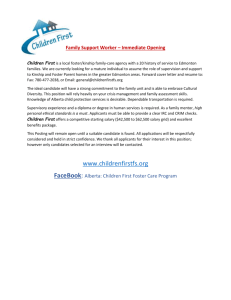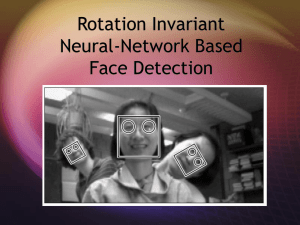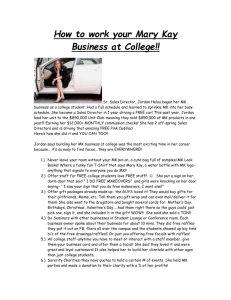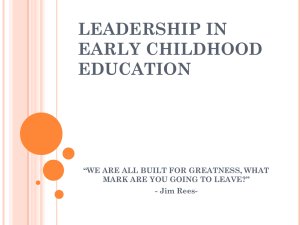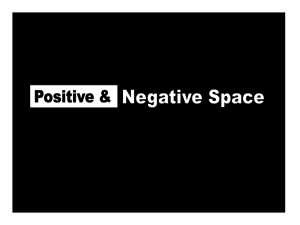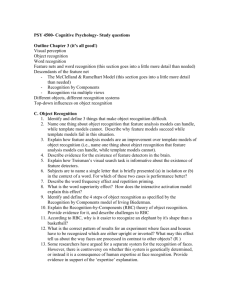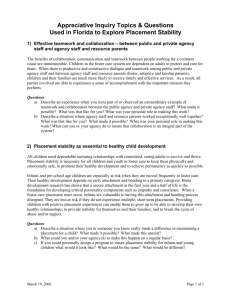Getting Started Manual - Faces of Virginia Families
advertisement
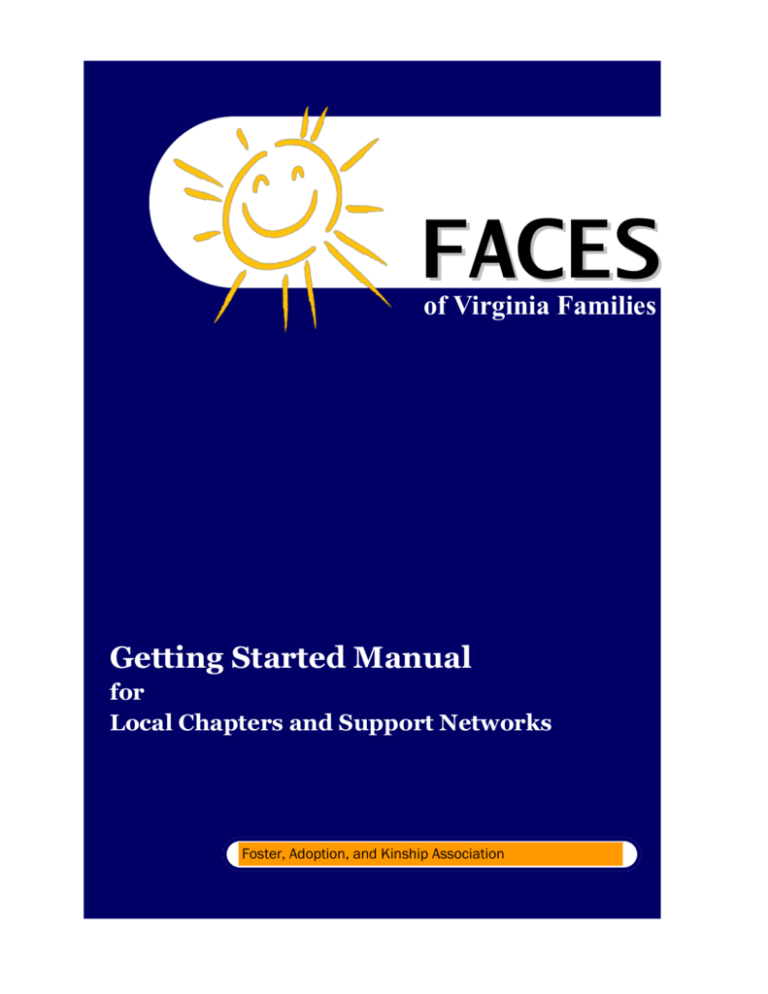
FACES of Virginia Families Getting Started Manual for Local Chapters and Support Networks Foster, Adoption, and Kinship Association , Adoption, and Kinship Association LET’S GET STARTED ON THE RIGHT FOOT… First things first. We want to thank you for your interest in helping families in your community. You have taken the first step in securing a beneficial support network for foster, adoptive, and kinship* families. FACES of Virginia Families will do everything in its power to help you have a positive, meaningful experience. At FACES we believe that family support is the key to achieving our mission. Families that are able to support one another and learn from one another are better It is the FACES mission equiped to bring about positive experiences for children and youth in their care. to provide a unified It is our hope that your local support network will develop into a local chapter of voice for children, youth, and families FACES. We are ready and able to help you make that a reality. Just call on us at involved in foster, 804-814-6865 or log on to our website, www.facesofvirginia.org to request adoptive, and kinship care so all children and assistance or information. youth are treated with dignity, respect, and equality. Our purpose in providing this manual is to provide you with some suggestions for getting a local chapter and support network started in your community. We hope this manual will provide you with assistance in thinking about how to organize your first family support networking efforts. We encourage you to keep in mind a few of the benefits of a local family support network for foster, adoptive, and kinship families. Families will learn about local and state resources that have helped others; Families will connect with other families to problem-solve and address challenges, together. Families will determine their own educational/training needs and have opportunities organize educational/training experiences based on their needs. So, let’s roll up our sleeves and get started. We have divided the work into six steps… Getting the word out...Page 2 Preparing for the first meeting...Page 4 Celebrating our differences...Page 7 Charting the course...Page Developing alliances with others...Page Keeping the momentum going...Page When you see the FACES sun, look for a bright idea from FACES. We have made every effort to write the manual in a manner that makes the reading easy and fast. We know your time is precious. Steps or ideas that we think are especially critical have been boxed and/or highlighted for you. This manual will always be a work in progress. As we learn from one another, we will discover ideas that will improve our work, together. Our website will have the most current version of the Getting Started Manual. We would love to have your feedback about how to improve on this manual. We believe that continual quality improvement is a mechanism that will make FACES of Virginia Families a statewide association that you can count on. We have added a feedback form to the last page of this manual. OK, let’s get started... *Kinship refers to grandparents and other relatives raising children. STEP 1. GETTING THE WORD OUT First meetings really are the hardest. It is a leap of faith. The most important thing is to keep talking to people about what you want to do and why. Often times people don’t even know that a support network can help them. It can seem to others as one more commitment for which they simply can’t spare the time. You will need to be able to explain how a FACES chapter and support network can add value to their daily lives, and you will need to make it real. Often explaining why you, personally, want to develop a support network will help others want to get involved. Who can help you get the word out? “ add a quote from a board member that describes how a support network has helped them. You can’t get the word out if you don’t talk about what you want to do to the people that know the foster, adoptive, and kinship families in your community. Talking to others is the first step toward recruiting families to your support network. Here are a few approaches to getting the word out in your community. 1. Contact a social worker at a local department of social services and explain what you want to accomplish. A local department social worker can be your best ally and support for getting in touch with other foster, adoptive, or kinship families in your community. The social worker may work exclusively with foster families, adoptive families, a foster care prevention, or the Temporary Assistance for Needy Families (TANF) program. If you need help identifying a social worker, please contact FACES. a. Caseworkers will know that if the families in their community have a support network, then the opportunity to recruit new foster, adoptive, and kinship families to care for children will be that much easier. A supportive caseworker can be an essential ingredient to your work in developing a support network. The caseworker can ensure that other caseworkers tell their families about your efforts and enlist their support in recruiting families. You should also ask your caseworker to help you get an appointment with your local department of social services director and the directors of private agencies. These individuals can open many doors for you, including providing a place to meet. You may find that these individuals are not in touch with the numerous informal kinship families in your community; try other approaches for reaching kinship families like the ones listed below (2). b. Local department of social services foster care workers will also be able to put you in touch with your regional Community Resource, Adoptive, and Foster Family Training (CRAFFT) program. These programs provide required training to resource, adoptive, and foster families through a contract with the Virginia Department of Social Services. You will want to be sure they have copies of materials about your FACES chapter and local support network so they can distribute the materials at their training classes. You may also ask them for the opportunity to come and address their training participants. A link to the CRAFFT programs is available on the FACES website. 2. Local clergy or other faith leaders will know about families in their congregation that are raising or helping to raise the children of relatives (kinship families). They will also know who the foster and adoptive families are in their faith community. Clergy and other faith leaders will be able to notify families of your efforts to develop a support network, and if they understand why you are working to develop this network we believe they will do everything in their power to assist you. These professionals may also help you with meeting space or publicizing your support network. FACES has a church bulletin inserts that you can use to notify local congregations about your support network. You can use the lower text box on these bulletins to add your local meeting location, day, and time. These bulletins are available on line at www.facesofvirginia.org and are included in the FACES Getting Started Packet. Local clergy and other faith leaders may also have an interfaith council or committee in your community. Contact a local clergy or faith leader and ask if there is an interfaith group in your community. If so, ask to come and speak with the group during one of their meetings. It is a great opportunity to get the word out to numerous congregations at one time—take church bulletins and FACES membership brochures with you. If you are asked to speak to the group you may want to use the FACES “Speaking Notes” available with your Getting Started packet or at www.facesofvirginia.org. 3. Libraries, School guidance counselors, Cooperative Extension offices, United Way agencies, and YMCAs are good places to distribute posters, flyers, and other announcements. Try to meet with at least one person in each of these categories before planning your first meeting. In talking with them you may learn about other major events that are occurring, so that you can distribute more information and you can be sure that you have not scheduled your first meeting on the date of a major family-oriented event. 4. Your local Community Center and Senior Center may also be able to help identify families that would be helped by a local support network. Ask to leave flyers or brochures with their staff and in the community rooms. 5. Don’t forget military installations. If you have a military base, including National Guard Armory, these are good places to contact for help in reaching military families, including grandparents and relatives carrying for the children of deployed personnel, and for providing free meeting space. If you are visiting a military base, don’t forget to bring identification. It may be best to call in advance for an appointment. Ask for the Family Assistance Coordinator or liaison. What to tell people when you are asking for their help? There are very specific questions you may need to be able to answer. We have made some suggestions for answering these questions. Keep in mind these are only suggestions. What is FACES of Virginia Families? FACES is a non-profit, charitable organization governed by foster, adoptive, and kinship families through a Board of Directors. The FACES mission is to provide a unified voice for children, youth, and families involved in foster, adoptive, or kinship families so that all children and youth are treated with dignity, respect, and equality. FACES is a vehicle for Family Advocacy, Collaboration, Empowerment, and Support by families and for families. What does a FACES chapter do for our community? A FACES chapter is like a home office for local support networks. A FACES chapter provides educational and training events based on the needs of the families in their support network(s). Each chapter will: develop local support networks for families; work with local and private agencies to identify and address issues/concerns expressed by foster, adoptive, and kinship families; and provide an educational and organizational forum for the local support networks. What is a FACES local support network? A FACES local support network is a group of foster, adoptive, and kinship families* that have decided to make themselves available to help members of their network in times of challenges by: being available to listen; sharing information or child-raising approaches that have worked for them; identifying resources that have been helpful to them; and recommending training/educational events to their chapter that meet the needs of the network. How will families be helped by a chapter and local support network? As a result of the FACES chapter and support network, families will have: a voice for change in state and local policies and practices; opportunities to self-determine and address their education and training needs; and other families to turn to during times of crisis or other stress. Who is responsible for the local chapter and support network? Chapters and support networks are managed by locally interested families. FACES provides support and resources to help these local chapters and support networks become and remain successful. Why should I help? Foster, adoptive, and kinship families help to provide stability and safety to children not living with their birth parent(s). Every community benefits from the work of these families, because without it these children may not have the resources necessary to grow into productive members of their community and society. Strong children build strong communities! Foster, adoptive, and kinship families receive few if any financial resources for providing for these children. A local FACES chapter and support network can help them learn from one another about alternative resources and gain a source of emotional support for their work. When does the local FACES chapter and support network start meeting and where? Only you can answer that question for now. As you identify the answer, please notify FACES, so that we can post the information on our website. You can email FACES at cnewbanks@facesofvirginia.org or register the information on our website at www.facesofvirginia.org. *It is important to note that some FACES chapters may decide to host local support networks that combine foster, adoptive, and kinship families into the same support network meeting. Others may have enough participants to be able to have a separate network meeting for each of the three types of families. Be aware that some families may be actively providing any or all of the three types of care. Step 2. Preparing for your first meeting Defining Peer Support There are number of agencies that have educational and support meetings for foster, adoptive, and kinship families. We applaud these agencies. FACES looks to add to these efforts, not replace them. We offer opportunities for the development, maintenance, and nurturing of family-based peer support network. Our Chapters will host only family-based peer support networks or networks facilitated by professionals not connected with child placing agencies. This form of support network leadership will allow families to be free to discuss issues and concerns that bring them to the support network. We believe that the professionals working at child placing agencies are valuable resources for all chapters and support networks, and we do not intend for family-based support to replace any support or educational groups which they are offering to families. Leading a Support Network Meeting A support network meeting allows families an opportunity to share feelings and experiences, so that they can honestly put their feelings on the table and receive assistance from other families in dealing with these feelings and experiences. It is just as important to know what a Support Network Meeting is not. It is not a gripe session, although there may be some griping. We all need to unload at times. Your job as the facilitator is to use the griping to uncover solutions to problems and help members offer alternative approaches to dealing with their issues and those expressed by other families. You will need a facilitator for the meeting. If, you as an organizer, are not comfortable leading a support network meeting, we suggest that you recruit a professional from outside of the social services system to assist you. This professional would need to sign the same confidentiality pledge that members will sign. We will discuss this pledge later. You may want to ask a local clergy, private therapeutic professional, or other professional to lead the support network meetings, so that you can have time to use the support network meeting to meet your needs as well. If you use a professional to faciliate the support network meeting, please ensure that the professional is not connected with a government or private child placing agency. Don’t forget the coffee... or other refreshments. Nothing warms people up like good refreshments. You may be able to get your local department or private agency to spring for the refreshments, since this support network will serve as a tool for recruiting and retaining foster, adoptive, and kinship families. Materials for the meeting You will want to have a sign-up sheet so that people can list their names and the contact information they want you to use for getting information to them about the support network and FACES. Some may prefer snail mail, others email or phone. Give them those options. Please have copies of the FACES Confidentiality Pledge for them to read and sign, including any outside facilitator. You will want to save this item to distribute to the group when you are ready to discuss confidentiality. Of course, this should be at the beginning of the meeting. Please see your FACES...Getting Started Packet for a copy of the Pledge or download the pledge from the FACES website, www.facesofvirginia.org. We suggest that you have copies of the FACES membership brochure available. There is a space on the front for your participants to write the day and time of the agreed upon Family Support Network meetings. If you have determined in advance the regular meeting day and time for the meetings, then you may want to have a stamp made that identifies your chapter and Your local department of social the day and time of meetings. services foster parent training division may be willing to use Title IV-e training dollars to pay for a stamp that will identify the date, time, and location of your support network meetings. Can’t hurt to ask! How FACES can help FACES is available to help you kick off your first meeting, and other meetings as our schedules permit. FACES will come to your first meeting and help chart your network’s path for the coming months. We use a mapping process that allows us to help participants decide on a course of action and development for the first year. The map we help you create is based on the participants input at the meeting. At the meeting we will discuss the differences between chapters and support networks and help define ways that FACES can help your work, locally. If you choose to go it alone at the meeting, then please contact us for any materials or consultation we can provide to you. We are here to help you have a successful experience for all of the foster, adoptive, and kinship families in your community. Materials you will need We suggest that you have flip charts and non-bleeding flip chart markers available at the first meeting. By writing information and ideas on the flip chart people can visually keep up with the content of the meeting and it can help them think of other related ideas. You will want to spend time with the participants getting organized about what you each want to accomplish by participating in this support network. You may want to plan for materials and activities that will help people get to know one another. Often you can divide people into small groups (numbering off will help ensure that people who don’t know one another get a chance to work together). Provide each group with an issue or activity related to developing a support network, ask them to be prepared to present their ideas to the full group in a set period of time. The first meeting won’t provide much time for discussing individual issues, although it should help members begin to feel comfortable with one another—and that is the first step in getting a support network off on the right foot. STEP 3. CELEBRATING OUR DIFFERENCES One of the first lessons is the recognition that foster, adoptive, and kinship families have different needs and expectations. These differences can divide or they can unite. It is up to the Support Network leader to chart a course that unites, rather than divides. We suggest you use these differences as the basis for a celebration. Celebrate that each type of family is working its hardest to raise children that will be healthy, happy, and safe. Celebrate that each type of family is fulfilling a necessary role. Celebrate that speaking in one voice each family type can support the needs of the others. Work diligently to have each type of family represented at your first meeting, so that the celebration gets started on the right foot. Here are some avenues for recruiting participation from foster, adoptive, and kinship families. Foster Families Local Departments of Social Services-Foster Care Workers Private Child Placing Agencies Adoptive Families Local Department of Social Services-Adoption Subsidy staff Private Child Placing Agencies Local Law offices and Family Courts Kinship Families Local Faith organizations (try using FACES bulletin inserts) Senior Centers Local Department of Social Services-TANF program Military bases Be sure to discuss with families at your first meeting, if they wish to meet as a support network in one group, or if each type of family would like to work toward having its own support network meeting. It may be that while this is a goal, there may not be enough participants to start off with three separate support network meetings. If the group wishes to have separate support network meetings, then ask for volunteers in each area to help you recruit families. Here is an organizational context for thinking about the connections between FACES, chapters, and support networks. FACES is the state voice for chapters, support networks, and members. FACES represents the interests of foster, adoptive, and kinship families. It works as one entity. The Board has a Vice President for each area—foster, adoptive, and kinship. During the nominations and election process, the FACES Board officers ensure that there is sufficient representation of each type of family and each region of the state. The FACES Board works to celebrate the different perspective that each type of family brings to this decision-making body. FACES Chapters are expected to have leadership from foster, adoptive, and kinship families. The chapter leadership is expected to organize local events for family members of FACES, and events are expected to provide an equal balance of support for each type of family. Chapters are also the organizing and administrative body for local support networks. Chapters determine their number of support networks for families based on the needs of their foster, adoptive, and kinship families. It is from input of families, that the chapter will decide if support networks will be organized by type of family or by area. Chapters may decide that based on the size of their community, only one support network can be hosted. In any case, the chapter must be sure to educate all families about recognizing and celebrating the existence of each type of family. Local Support Networks of each Chapter are mutual self-help support networks. At the support network meeting, families are encouraged to discuss the challenges and issues they are facing at home, so that other families can provide them with emotional support and resource/contact information that may offer them some relief. If foster, adoptive, and kinship families are meeting together as one support network, it will be important for the support network leader to provide opportunities for all support network participants to have their needs met. For example, a support network meeting that focuses the entire time on the trials of being a foster parent will not likely meet the needs of the kinship participant that has come to the meeting. Celebrating the differences may require you to have an agenda which allows each person in the room to verbalize what they would like to discuss at the meeting. It is important that all support network participants have a Take time at each Chapter and Support Network meeting to recognize a unique issue, resource, or event that is specific to each type of family: foster, adoptive, and kinship. This will help your participants feel that their presence is valued and celebrated! support network meeting that addresses their needs. Writing the topics on the easel paper at the beginning of the meeting may help you keep yourself and the group focused on the needs of all participants. FACES hopes to begin offering support group facilitation training in the future. Please stay tuned to the website for notice about any FACES trainings. Step 4. Charting the Course At your first meeting you will discuss with the participants what they want from a Family Support Network. Typically, families indicate they are looking for resource information, educational opportunities that will help them in their homes, and someone they can call on to listen to them. A Family-based Peer Support Network can deliver this and so much more. Take time during your first meeting to identify the expectations of all participants, and then work with them to decide how to get results that satisfy their needs. Local Chapters Forming a local FACES of Virginia Families Chapter is a good first step to keeping your efforts organized. Local chapters are the “business” arm of local support networks. The Chapters handles soliciting local membership, keeping local members informed about the work of the State Association, reporting local news and views to the state association, and assisting in the regional efforts of the FACES to recruit and retain foster, adoptive, and kinship families. Chapter meetings precede the family support network meeting on the agenda. The Chapter meeting is usually open to all associate, professional staff and professional staff and family members, including all local family support network members. Chapters are encouraged to utilize professional resources as speakers and consultants for Chapter meetings. Immediately following Chapter meetings, all foster, adoptive, and kinship families are invited to remain for the family-based peer support network meeting. Be sure to identify prior to the support network meeting, if your have separate meetings for each type of family or if your families meet together. Family-Based Support Network Meetings FACES of Virginia Families’ Support Networks are organized to provide a family-led forum for foster, adoptive, or kinship families to discuss their issues, concerns, and needs as they work to provide safe, loving homes for children not living with their birth parents. These support network meetings are also an avenue for families to share resource and other service information that may be of benefit to other families like theirs. FACES support network meetings should be kept small (preferably, less than 20 participants), so that everyone attending has the opportunity to participate and gain value from their attendance. Support groups will normally follow chapter meetings, although some organizers may host support group meetings during other times, so that the maximum number of families can participate. Consideration should be given by the network about how to best assist professional staff of local or private agencies who are also members of foster, adoptive, and kinship families. In some cases, your network may be comfortable with their participation, and others may want to develop a specialized support group for professional staff serving as foster, adoptive, or kinship families. In any case, you need to be sure that any decision is unanimous. If your support network decides to allow professional staff serving in the family capacity to participate, please be sure they disclose this role at the beginning of each meeting. Each support network meeting must begin with the reciting of the confidentiality pledge. All members must have signed a copy of the pledge in order to participate. This pledge helps you to keep members invested in participating in the network with confidence. Participants in a FACES Support Network meeting should be asked to stay for the entire meeting, barring unforeseen emergencies. Other Support Group participants may feel devalued if other participants were to leave during the meetings. Organization and Logistics of Support Group meetings All FACES Support Group meetings should be held in a neutral location (outside of a private or local child placing agency offices). If a private or local child placing agency office is used it should be agreeable to all network members. FACES Support Group meetings should be held in a location that will permit a child care area if possible. Your support network members should notify the child care organizer in advance of their need for child care. Although, it should be understood by organizers and facilitators of the support network meetings that there will be times when families may have emergencies that require them to use child care even though they have not requested this service in advance. If network members are going to serve as child care volunteers, you will need to have assurances that criminal background and child protection checks are clear before the volunteer provides the child care at your network meeting. FACES Support Group meetings are set up as a circle of chairs with no distinguishable head. A table should be set up in the room for literature, including membership brochures. Facilitators of Support Networks Facilitators can receive specific training for leading and organizing support networks. Training can assist facilitators in developing or refining skills that promote non-threatening, comfortable, and productive support group meetings. The facilitator is responsible for assuring that all participants honor the FACES Confidentiality and Respect Pledge. For assistance in securing training, please log on to the FACES website to contact your local FACES representative. The Confidentiality Pledge Families will need to know that they can speak their minds in a safe, confidential environment. It is the job of each participant as well as the facilitator to make the support network a safe place for open dialogue. Each member must sign the confidentiality pledge and the network facilitator must keep a record of each person that has signed, so that new participants are provided copies to sign as they join the network. Each Support Network meeting should begin with a discussion or recitation of the confidentiality pledge, so that everyone is reminded of its importance to the network. The FACES Mutual Respect & Confidentiality Pledge As a member of FACES of Virginia Families, I pledge to treat each member with respect by listening with an open mind, remaining present for the entire meeting, and responding with a helpful voice. I will treat all information shared with strictest confidence and will not discuss any members’ personal disclosures outside of the confines of this support network meeting, so that all members feel safe in sharing their most personal experiences. I agree that failure to honor this confidence, whether accidental or purposeful, will result in my restriction from attending FACES support network meetings. As a member of FACES of Virginia, I willingly recite this Mutual Respect and Confidentiality Pledge, because I value and respect the sharing of our personal struggles and joys so that we are able to learn from one another and continue providing the best to the children entrusted to our care. Step 5. Developing Alliances FACES is an organization that respects and values collaboration with others. It is through this collaborative approach to addressing challenges that we hope to improve the lives of foster, adoptive, and kinship families throughout Virginia. Collaboration develops allies for an organization. The FACES chapters and support networks must take time to build relationships in their community that will help encourage families to join the network; and help the network develop a reputation of being a partner in the business of caring for children in your community. Your Chapter and Support Network can be one of the most important tools available to your local department and private child placing agencies for recruiting and retaining foster, adoptive, and kinship families. Research from a Casey Collaborative Research Project demonstrates that supported families are the best recruiters for new families to become involved in child welfare. Potential alliances exist in every community. To develop those alliances, you need sponsors. Every member of your support network will know someone in a position to help support your cause; recruit members; or negotiate challenges facing your families. These members become sponsors that get you access to resources. Your best opportunity to discover these potential allies is at the close of each meeting. Identify at the closing, any issues or needs that have been surfaced during the meeting. (Use the easel pad, it helps people visualize the challenges.) 1. Ask members to think about people they know that may have resources to assist in meeting the identified issues or needs. 2. Get a commitment from those people that have identified resources to get back in touch with you within one week. 3. Keep track of the identified resources, so that you can begin developing an alliance with these people or organizations. 4. Prepare introductory packets for all potential allies and distribute these to the member that will act as a FACES sponsor with the identified organization or individual. 5. Consider how the following types of organizations can help support the work of your chapter and support network: Local departments of social services Private child-placing agencies YMCA/YWCA Libraries School Guidance Counselors Local PTAs United Way Cooperative Extension Offices Faith Communities Faith-based organizations Mayor’s offices Legislators Media outlets (TV, Radio, Newspapers, etc.) Military bases Developing supportive alliances will help you help your families. Step 6. Keeping up the Momentum The key is to share the load. You can not do everything yourself. If you try, then you will not be strong enough to support the families that will be counting on you. You should also know that the more people you recruit to help you develop allies the more allies you and your support network will have. So, share the load and the momentum will grow. Call on FACES for support and consultation. Together, we can develop a unified voice speaking out for children and their families in every community in Virginia. Thank you.
